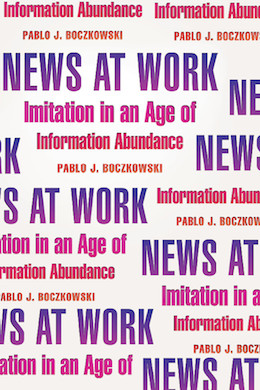Stephen Colbert and News at Work
In a piece for the Atlantic on the debut of Stephen Colbert’s new late night gig, Megan Garber leverages some scholarship from Pablo Boczkowski’s News at Work: Imitation in an Age of Information Abundance, which positions the thriving competition and rampant imitation prominent among journalists as impetus for our desires to instantly consume—and then avoid acrimonious public conversations about—breaking news (especially that of the political kind). Garber sees Colbert as a song-and-dance Charlie Rose, rather than a David Letterman, and goes on to frame his debut as part of the slow creep of politics into entertainment and entertainment into politics, ultimately noting Boczkowski’s discussion of chatting about politics with our peers.
[P]olitics and late-night comedy have long been happy, if occasionally awkward, bedfellows. Clinton, saxophoning with Arsenio. Bush, chatting with Leno. Obama, chatting with ferns. But Colbert was, in subtle but significant ways, different. He wasn’t treating Jeb as a celebrity, giving him an easy opportunity for free, and content-free, media; he was treating him as a person who is running for political office. He was actually interviewing him. He was trying to have a conversation with him about things that directly affect people’s lives. (Same, to some extent, with George Clooney, Colbert’s first guest: The two talked about acting and movie-making, but they also talked about Darfur.)
That’s not a good thing, for people or for democracy. And Colbert’s latest debut suggested that late-night comedy might actually play a role in fixing it.
***
To read more about News at Work, click here.
